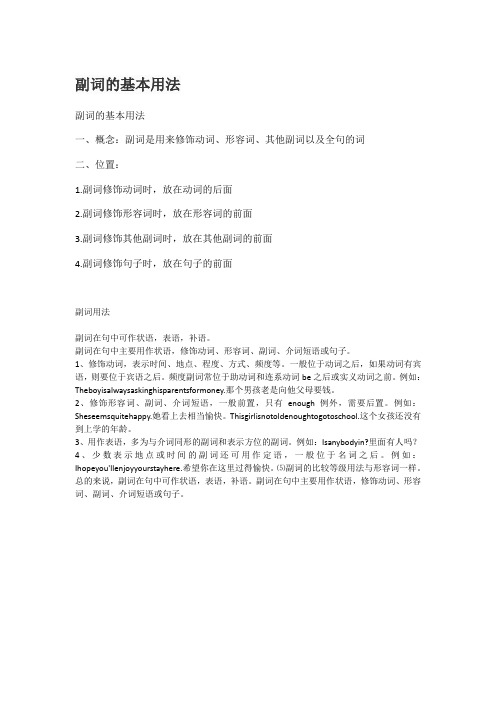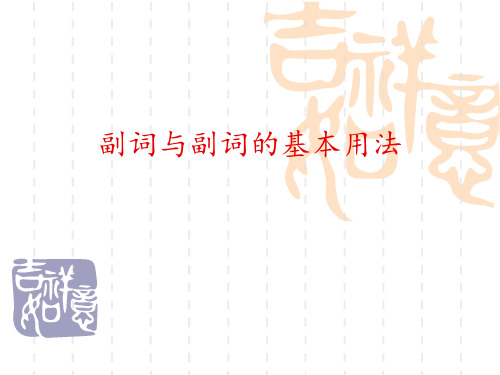副词用法ppt课件
合集下载
副词的用法

副词在中文中扮演着修饰动词、形容词、其他副词或全句的重要角色。根据其功能和意义,副词可分为多种方式,包括方式副词如“小心地”表达动作方式,地点副词如“这里”指示方位,时间副词如“最近”表示时间,程度副词如“很”表示程度,还有连接、疑问、关系和感叹副词等。各类副词在句中发挥着不同的作用,如方式副词描述动பைடு நூலகம்的方式,地点副词指明动作发生的地点,时间副词确定动作发生的时间,而程度副词则强调动作或状态的程度。连接副词用于连接句子和表达各种关系,疑问副词用于提问,关系副词引导定语从句。此外,副词在句子中的位置灵活多变,通常遵循一定的顺序:程度副词、状态副词、地点副词和时间副词。通过丰富的例句,我们可以更深入地理解各类副词的用法和语境。
形容词和副词PPT课件

A house smells as if it hasn’t
lived in for years.
A. little white wooden B. little wooden white
C. white wooden little D. wooden white little
4) A Students are required to take part in
4. The apple tastes __C___ and sells ___ .
A. well; well
B. good; good
C. good; well
D. well; good
5. Your answer sounds __A___ .
A. correct C. correctness
certain表示“某”时,只能用作定语:a certain
person 某人。
例题:
1. She was _____ (luck) to lose her money when she went shopping last weekend. [04西宁]
答案点拨:was是系动词,其后要跟形容词作表语, luck的形容词形式为lucky,但我们填上后发现句意不通: 丢了钱她还能幸运吗?肯定是“不幸”,故应填它的反 义词unlucky。 2. This kind of skirt looks __ and sells__. [04天津]
3.—What do you think of the story written by Mark
Twain?
—It is ________. I like it. [04昆明]
A. boring
高中英语九大词性分类与用法详解课件:专题04 副词

以“元音y, 读音为/ai/”,直接+ly, 如: dry-dryly; shy---shyly
3. 绝大多数以e结尾的形容词直接+ly, 如:polite-politely; wide-widely; wise-wisely; nice-nicely 少数以e结尾的形容词,要去掉e再加-ly, 如: true-truly; due-duly
finally quietly
2、 地点副词(Adverbs of Place): 说明动作在什么地方发生的副词
1)We have looked everywhere for our missing schoolbags. 2)Yesterday I went nowhere.
地点副词有:
above 在……上面 below 在…下方
today 今天 yesterday 昨天 tomorrow 明天 tonight 今夜
nowadays 现今
lately 最近
recently 最近
immediately 立刻 presently 目前 already 已经
在时间副词中还包含频度副词:表示不定时间的副词叫频度副词
对频度副词提问用“How often” 频度副词应放在行为动词之前或者连系动词之后:行前Be后
1)Let’s go to the cinema together. 2)We will finish this task easily. 3)My little brother behaved badly.
常用的方式副词有:
anyhow actively slowly immediately calmly late early carefully quickly
3. 绝大多数以e结尾的形容词直接+ly, 如:polite-politely; wide-widely; wise-wisely; nice-nicely 少数以e结尾的形容词,要去掉e再加-ly, 如: true-truly; due-duly
finally quietly
2、 地点副词(Adverbs of Place): 说明动作在什么地方发生的副词
1)We have looked everywhere for our missing schoolbags. 2)Yesterday I went nowhere.
地点副词有:
above 在……上面 below 在…下方
today 今天 yesterday 昨天 tomorrow 明天 tonight 今夜
nowadays 现今
lately 最近
recently 最近
immediately 立刻 presently 目前 already 已经
在时间副词中还包含频度副词:表示不定时间的副词叫频度副词
对频度副词提问用“How often” 频度副词应放在行为动词之前或者连系动词之后:行前Be后
1)Let’s go to the cinema together. 2)We will finish this task easily. 3)My little brother behaved badly.
常用的方式副词有:
anyhow actively slowly immediately calmly late early carefully quickly
人教英语形容词、副词比较级和最高级的用法 (共19张PPT)

popular
10. We are glad to see that Shanghai is developing ___ these years than ever before.
√ A. quickly B. less quickly C. more quickly D. the most quickly
√A. heavy B. heavier C. heaviest D.heavily
14.Li Hua's shoes are as__ as Zhang Hua's.
√A. cheap B. cheaper C. the cheaper
D.the cheapest
15. In the piano contest, my brother didn't play well and I did __.
funnier more serious
easier more athletic
happier
more important more popular
more exciting
more relaxing
形容词和副词的比较级和最高级的基本用法
一、比较级:
表示两者(人或事物) 的比较,常用于“比较级 + than”的结构 中 eg:Tom is taller than Kate. 汤姆比凯特高
√C. longer,more outgoing
D.longer,outgoing
4.I think English is as __as chinese.
√A. important
B. more important
C. most important
D.the most important
10. We are glad to see that Shanghai is developing ___ these years than ever before.
√ A. quickly B. less quickly C. more quickly D. the most quickly
√A. heavy B. heavier C. heaviest D.heavily
14.Li Hua's shoes are as__ as Zhang Hua's.
√A. cheap B. cheaper C. the cheaper
D.the cheapest
15. In the piano contest, my brother didn't play well and I did __.
funnier more serious
easier more athletic
happier
more important more popular
more exciting
more relaxing
形容词和副词的比较级和最高级的基本用法
一、比较级:
表示两者(人或事物) 的比较,常用于“比较级 + than”的结构 中 eg:Tom is taller than Kate. 汤姆比凯特高
√C. longer,more outgoing
D.longer,outgoing
4.I think English is as __as chinese.
√A. important
B. more important
C. most important
D.the most important
英语频率副词用法ppt课件

.
12
为深入学习习近平新时代中国特色社 会主义 思想和 党的十 九大精 神,贯彻 全国教 育大会 精神,充 分发挥 中小学 图书室 育人功 能
0%
always usually often sometimes rarely never
100 %
Remember
.
13
为深入学习习近平新时代中国特色社 会主义 思想和 党的十 九大精 神,贯彻 全国教 育大会 精神,充 分发挥 中小学 图书室 育人功 能
.
6
为深入学习习近平新时代中国特色社 会主义 思想和 党的十 九大精 神,贯彻 全国教 育大会 精神,充 分发挥 中小学 图书室 育人功 能
I play basketball once a week.
Mon Tue Wed Thu Fri Sat Sun
123456 7 8 9 10 11 12 13 14 15 16 17 18 19 20 21 22 23 24 25 26 27 28 29 30 31
为深入学习习近平新时代中国特色社 会主义 思想和 党的十 九大精 神,贯彻 全国教 育大会 精神,充 分发挥 中小学 图书室 育人功 能
I read a book everyday.
Mon Tue Wed Thu Fri Sat Sun
123456 7 8 9 10 11 12 13 14 15 16 17 18 19 20 21 22 23 24 25 26 27 28 29 30 31
I play basketball once a week. I _____________ play basketball.
always usually
often sometimes
副词的用法

副词的基本用法
副词的基本用法
一、概念:副词是用来修饰动词、形容词、其他副词以及全句的词
二、位置:
1.副词修饰动词时,放在动词的后面
2.副词修饰形容词时,放在形容词的前面
3.副词修饰其他副词时,放在其他副词的前面
4.副词修饰句子时,放在句子的前面
副词用法
副词在句中可作状语,表语,补语。
副词在句中主要用作状语,修饰动词、形容词、副词、介词短语或句子。
1、修饰动词,表示时间、地点、程度、方式、频度等。
一般位于动词之后,如果动词有宾语,则要位于宾语之后。
频度副词常位于助动词和连系动词be之后或实义动词之前。
例如:Theboyisalwaysaskinghisparentsformoney.那个男孩老是向他父母要钱。
2、修饰形容词、副词、介词短语,一般前置,只有enough例外,需要后置。
例如:Sheseemsquitehappy.她看上去相当愉快。
Thisgirlisnotoldenoughtogotoschool.这个女孩还没有到上学的年龄。
3、用作表语,多为与介词同形的副词和表示方位的副词。
例如:Isanybodyin?里面有人吗?
4、少数表示地点或时间的副词还可用作定语,一般位于名词之后。
例如:Ihopeyou'llenjoyyourstayhere.希望你在这里过得愉快。
⑸副词的比较等级用法与形容词一样。
总的来说,副词在句中可作状语,表语,补语。
副词在句中主要用作状语,修饰动词、形容词、副词、介词短语或句子。
副词及副词的基本用法

副词可以根据它们的意思和用途分为时间副词地点副词方式副词程度副词频度副词疑问副词连接副词和关系副词62a时间副词theadverbtime时间副词表示行为动作发生的时间常可回答when引导的问句时间副词有表示确切时间和模糊时间两种
副词与副词的基本用法
副词用来表示动作行为的方式、时间和处所,对形容词和副 词在程度上加以描绘,真实生动地反映动作行为及所陈述事 情的性质特征。 1 副词的作用 1A 副词一般用来修饰动词、形容词、其它副词、介词短语 和句子,在句中作状语,表示时间、地点、方式;也可以修 饰整个句子,表示说话人对话语的态度和看法,就是用副词 词组做评注性状语;做连接性状语,这种副词词组的中心词 叫做连接副词conjunctive adverb. eg.‚Don‘t do that again.‛ he said quietly and firmly.(修饰动词) ‚以后别再那样做了。‛他说,口气温和但很坚定。 This is a fairly easy book.(修饰形容词) 这是一本比 较浅易的书。 Its heart beats very slowly.(修饰副词) (它的)心 脏跳得很慢。 Lincoln was active in politics and was strongly against slavery.(修饰介词短语) 林肯积极参加政治活动,强烈反对奴隶制度。 Actually he is a person of honesty .(修饰句子) 事 实上,他是个诚实的人。
ห้องสมุดไป่ตู้
6.2D 程度副词(The Adverb of Degree) 程度副词大多用来修饰形容词和副词,就其反映的事情在程 度上加以描绘,通常也可回答how引导的问句。常见的程度副 词有:very, much, quite, little, so, too, enough, half, rather, fairly, pretty, entirely, totally, greatly, deeply, hardly, wholly, slightly, scarcely, almost等。 注:在上面几类副词中,有些副词有两种词形:一种与相应 的形容词同形,另一种由相应的形容词(或副词)加后缀构 成。这两种词形的副词,有些在含义上基本相近,另一些在 含义上则截然不同。
副词与副词的基本用法
副词用来表示动作行为的方式、时间和处所,对形容词和副 词在程度上加以描绘,真实生动地反映动作行为及所陈述事 情的性质特征。 1 副词的作用 1A 副词一般用来修饰动词、形容词、其它副词、介词短语 和句子,在句中作状语,表示时间、地点、方式;也可以修 饰整个句子,表示说话人对话语的态度和看法,就是用副词 词组做评注性状语;做连接性状语,这种副词词组的中心词 叫做连接副词conjunctive adverb. eg.‚Don‘t do that again.‛ he said quietly and firmly.(修饰动词) ‚以后别再那样做了。‛他说,口气温和但很坚定。 This is a fairly easy book.(修饰形容词) 这是一本比 较浅易的书。 Its heart beats very slowly.(修饰副词) (它的)心 脏跳得很慢。 Lincoln was active in politics and was strongly against slavery.(修饰介词短语) 林肯积极参加政治活动,强烈反对奴隶制度。 Actually he is a person of honesty .(修饰句子) 事 实上,他是个诚实的人。
ห้องสมุดไป่ตู้
6.2D 程度副词(The Adverb of Degree) 程度副词大多用来修饰形容词和副词,就其反映的事情在程 度上加以描绘,通常也可回答how引导的问句。常见的程度副 词有:very, much, quite, little, so, too, enough, half, rather, fairly, pretty, entirely, totally, greatly, deeply, hardly, wholly, slightly, scarcely, almost等。 注:在上面几类副词中,有些副词有两种词形:一种与相应 的形容词同形,另一种由相应的形容词(或副词)加后缀构 成。这两种词形的副词,有些在含义上基本相近,另一些在 含义上则截然不同。
初中英语语法 频度副词的基本用法课件

Grammar focus 频度副词
1. 你通常在周未做什么? _W__h_a_t_ _d_o_ you u_s_u_a_l_ly_ do on weekends?
2. 我总是去运动。 I a_l_w__a_y_s e_x_e_r_c_is_e_. 3. 他们在周未做什么?
W__h_a_t__ _d_o_ they _d_o_ on weekends?
The End
Grammar focus 频度副词
7. 你多久去看电影一次? H__o_w__ o_f_t_en__ do you go to the m__o_v_i_e_s?
8. 我可能一个月去看一次。 I go to movies m__a_y_b_e_ _o_n_c_e_ a _m__o_n_t_h.
9. 他多久看一次电视? H__o_w_ _o_f_t_e_n_ does he watch TV?
12. 不,我从不去购物。 No, I _n_e_v_e_r___g_oshopping.
语法小贴士
对频率提问
1. how often 意为 “__多_久__一__次___”,是用于 提问表示 _频__率_ 的特殊疑问词组。其答 语应为表示 _频__率__ 的副词或副词词组。 句子的时态一般是_一__般__现_在__时__态___,也 可以是一般过去时。
3. When do your friends exercise?
They weekends.
exercise on
4. When does Scott go to work?
He
goes to work at eleven
o’clock. He’s never late.
根据你自己的情况用适当的频度副词回答问题.
- 1、下载文档前请自行甄别文档内容的完整性,平台不提供额外的编辑、内容补充、找答案等附加服务。
- 2、"仅部分预览"的文档,不可在线预览部分如存在完整性等问题,可反馈申请退款(可完整预览的文档不适用该条件!)。
- 3、如文档侵犯您的权益,请联系客服反馈,我们会尽快为您处理(人工客服工作时间:9:00-18:30)。
9
(3) 及物动词和副词 (如:down, on, off,
in, out, up等)组成的动词词组,如果宾语
是名词,该名词可放在副词之前或之后,如
果宾语是代词,一定要放在副词前.
例: He cut down the tree.
He cut the tree down.
* He cut it down . * Pick it up, please.
2
Using adverbs with verbs Some adverbs tell us how people do things. We usually make these adverbs by adding –ly to adjectives.
• travel _________ (wide) • be sold ________ (quick) • watch sth._______ (close) • sit __________ (quiet) • leave the room __________ (excited) • listen to customers ________ (patient) • speak to sb.__________ (rude) • behave _________(bad) • smile___________ (cheerful) • add up all the bills __________ (accurate) 3
Grammar
Adverbs
1
副词的构成和种类
副词的构成: 1. 加ly 2.--y 改写成 ily 3.--ic加-ally 4. 去e 加 ly / y
5.不变
careful---carefully angry---angrily historic---historically true---truly simple---simply possible---possibly hard fast late early
almost.. 5.频度 always , frequently , ever , never … 6.连接 however , moreover , thus ,
therefore… 7.疑问 how, when , why …
5
副词在句子中的位置
1.时间副词和地点副词的位置 (1)表示确定时间的副词和地点的副词,一般放在
7
2.修饰形容词和副词的程度副词,除 enough后置外,一般放在被修饰词的
前面.副词在此作状语. 如
completely well well enough fast enough … Liu Xiang ran fast enough to
break the world record.
8
3.修饰动词的方式副词的位置
句尾,如句中同时有地点副词和时间副词,地点 副词在前,时间副词在后. eg. He came to school by taxi yesterday. • I couldn’t find it though I’ve looked everywhere. • The captain told the sailors to go out of the hall finally.
***** work___h_ar_d____ (hard) come to school __l_a_te____ (late) type ___f_a_st____ (fast) sing __w__el_l ___ (good) feel___w_e_ll____ (well) * get up _e_a_rl_y_____ (early)
4. I heard a girl __B___outside and I went out to have
a look.
a. to cry b. crying c. cried d. cry
4.修饰名词的副词放在被修饰词之后
例: The man there is my father .
the students here
10
Checkout
1.My brother can drive as ____B_____as I.
a .good b. well c. better d. best
6
副词在句子中的位置
(2)表示不确定时间的副词通常放在行为动词 前,但要放在be动词,助动词,情态动词后,如: always, usually, often, never ever, seldom, sometimes, rarely, generally …
eg. He never lies after that. He is sometimes late for school.
*friendly / lively / lovely adj. 4
副词的种类
1.时间 before , early , finally , now … 2.地点 here , above , outside , below ,
there… 3.方式 hard , fast , badly , well… 4.程度 very , quite, much __C___speak English when he was a
child.
a. hard b. easy c. hardly d. Easily
3.I remember___C___ the key but he denied.
a. return b. returned c. returning d. to return
(1) 修饰不及物动词时,该副词要置后, 如:walk slowly
His brother can play football well. (2) 修饰及物动词时,可放在被修饰词之前
或宾语之后,如宾语较长也可放在动词 和宾语之间. 如:study English hard,
see clearly the words on the blackboard…
(3) 及物动词和副词 (如:down, on, off,
in, out, up等)组成的动词词组,如果宾语
是名词,该名词可放在副词之前或之后,如
果宾语是代词,一定要放在副词前.
例: He cut down the tree.
He cut the tree down.
* He cut it down . * Pick it up, please.
2
Using adverbs with verbs Some adverbs tell us how people do things. We usually make these adverbs by adding –ly to adjectives.
• travel _________ (wide) • be sold ________ (quick) • watch sth._______ (close) • sit __________ (quiet) • leave the room __________ (excited) • listen to customers ________ (patient) • speak to sb.__________ (rude) • behave _________(bad) • smile___________ (cheerful) • add up all the bills __________ (accurate) 3
Grammar
Adverbs
1
副词的构成和种类
副词的构成: 1. 加ly 2.--y 改写成 ily 3.--ic加-ally 4. 去e 加 ly / y
5.不变
careful---carefully angry---angrily historic---historically true---truly simple---simply possible---possibly hard fast late early
almost.. 5.频度 always , frequently , ever , never … 6.连接 however , moreover , thus ,
therefore… 7.疑问 how, when , why …
5
副词在句子中的位置
1.时间副词和地点副词的位置 (1)表示确定时间的副词和地点的副词,一般放在
7
2.修饰形容词和副词的程度副词,除 enough后置外,一般放在被修饰词的
前面.副词在此作状语. 如
completely well well enough fast enough … Liu Xiang ran fast enough to
break the world record.
8
3.修饰动词的方式副词的位置
句尾,如句中同时有地点副词和时间副词,地点 副词在前,时间副词在后. eg. He came to school by taxi yesterday. • I couldn’t find it though I’ve looked everywhere. • The captain told the sailors to go out of the hall finally.
***** work___h_ar_d____ (hard) come to school __l_a_te____ (late) type ___f_a_st____ (fast) sing __w__el_l ___ (good) feel___w_e_ll____ (well) * get up _e_a_rl_y_____ (early)
4. I heard a girl __B___outside and I went out to have
a look.
a. to cry b. crying c. cried d. cry
4.修饰名词的副词放在被修饰词之后
例: The man there is my father .
the students here
10
Checkout
1.My brother can drive as ____B_____as I.
a .good b. well c. better d. best
6
副词在句子中的位置
(2)表示不确定时间的副词通常放在行为动词 前,但要放在be动词,助动词,情态动词后,如: always, usually, often, never ever, seldom, sometimes, rarely, generally …
eg. He never lies after that. He is sometimes late for school.
*friendly / lively / lovely adj. 4
副词的种类
1.时间 before , early , finally , now … 2.地点 here , above , outside , below ,
there… 3.方式 hard , fast , badly , well… 4.程度 very , quite, much __C___speak English when he was a
child.
a. hard b. easy c. hardly d. Easily
3.I remember___C___ the key but he denied.
a. return b. returned c. returning d. to return
(1) 修饰不及物动词时,该副词要置后, 如:walk slowly
His brother can play football well. (2) 修饰及物动词时,可放在被修饰词之前
或宾语之后,如宾语较长也可放在动词 和宾语之间. 如:study English hard,
see clearly the words on the blackboard…
